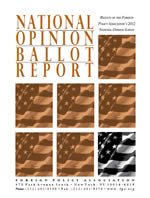Support for U.S. response to Arab Spring in National Opinion Ballot

Americans participating in the Great Decisions annual National Opinion Ballot express strong support for the U.S. response to Arab Spring.
by Tyler Benedict
The “Arab Spring” of 2010-2011 put the United States in a precarious position as it tried to navigate  through a sea of revolution in the Middle East. As the political landscape of the region changed, the U. S.’s foreign policy changed as well in an attempt to stay ahead of the Middle East’s democratic realignment.
through a sea of revolution in the Middle East. As the political landscape of the region changed, the U. S.’s foreign policy changed as well in an attempt to stay ahead of the Middle East’s democratic realignment.
Because of the complex political situation in the Middle East and the close relationships between the United States and certain Arab autocrats, the U. S. response to the Arab Spring was not always consistent. For example, the United States spoke out vociferously against the abuses of Libyan dictator Muammar Qadhafi and supported NATO military action to end his regime while seemingly ignoring similar repression in Bahrain. According to the Foreign Policy Association’s National Opinion Ballot Report, 64 percent of respondents favored the way that the United States handled the NATO mission in Libya, while an overwhelming 83 percent felt that the United States should “reassess” its relationships with semidemocratic allies like Bahrain and Saudi Arabia.
This suggests that most balloters would prefer a more consistent approach to supporting democratic movements in the Middle East, as well as less unilateral intervention in Middle Eastern affairs. On the whole, however, most respondents agreed that the U. S. handled the Arab Spring well, with 68% of respondents saying that the United States is on the “right side” of the Middle East’s new governments.
But who will those new governments be? After decades of friendly relations with autocratic allies, the United States now faces the possibility of dealing with popularly elected leaders who are more accountable to constituents at home. The rise of the Muslim Brotherhood and other Islamist parties in the Middle East is also significant, because the United States may need to negotiate with such parties in order to maintain peace in the Middle East. The long-term effects of the Arab Spring on the geopolitical landscape are yet to be seen, but so far Great Decisions balloters generally approve of how the U.S. has navigated this unfamiliar territory.
READ THE 2012 NATION OPINION BALLOT REPORT





